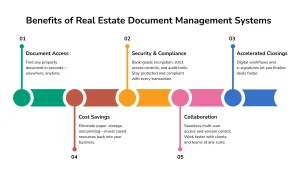In today’s fiercely competitive and fast-moving real estate landscape, the need for efficient, secure, and scalable document management has never been greater. Real estate professionals juggle endless paperwork, from contracts and listing agreements to compliance files and client data.
Modern Document Management Systems (DMS) have transformed the way agencies operate—delivering not just convenience, but a competitive edge.
Here are the top 5 benefits of deploying a real estate DMS in 2025, tailored for agencies aiming to lead in a digital-first market.
1. Centralized, Instant Document Access
Time is money in real estate. A DMS is a secure, centralized hub for property files, contracts, and reports. With every document instantly searchable, agents and staff no longer waste time searching emails or paper files.
For example, if a closing coordinator is finalizing a transaction and needs the latest title search and signed purchase agreement. With a DMS, they instantly retrieve both documents during a conference call with the buyer and seller, ensuring the closing process stays on track.
Centralizing documents streamlines collaboration, saves hours of administrative time, and enables faster, more responsive service to clients and partners.
- Access any document, from anywhere, at any time—vital for remote teams or agents in the field.
- Advanced search and filtering features allow instant retrieval of critical documents at the point of need.
- Speeds up closings by enabling digital document routing and e-signatures, allowing agents to finalize deals in hours rather than days.
2. Enhanced Security and Regulatory Compliance
Real estate deals hinge on sensitive information, including client IDs, financial records, contracts, and legal disclosures. A modern DMS protects this data with bank-grade encryption, multi-factor authentication, and robust, role-based permissions.
- Minimize the risk of internal data leaks or costly breaches with granular access control.
- Ensure compliance with regulations (like GDPR and CCPA) through automatic audit trails and permission histories.
- Automated document retention policies and change tracking simplify audits, keeping you compliant and reducing risk while supporting your brand’s credibility.
3. Accelerated Closings and Digital Workflows
Manual paperwork is outdated. DMS platforms automate processes—routing, approvals, and e-signatures—so you close deals faster.
- Pre-built templates, automated document routing, and e-signature integration expedite deals, which is critical in hot markets where speed matters most.
- Clients sign from anywhere; agents send, receive, and confirm—all within minutes, not days.
- Teams free up time to focus on client relationships and deal-making rather than administrative tasks.
4. Cost Savings and a Paperless Office
Physical document management consumes resources: printing, mailing, file storage, and human admin. Going digital slashes these expenses while supporting environmentally sustainable practices.
- DMS adoption lets offices repurpose file rooms, cut supply costs by up to 80%, and reduce their carbon footprint.
- Operating cloud-native platforms enables seamless growth without investment in physical infrastructure—a vital advantage for scaling agencies.
5. Improved Collaboration and Scalability
Today’s real estate teams are distributed—they work across offices, regions, or even countries. A cloud-based DMS empowers real-time, permissioned collaboration.
- Multiple stakeholders—agents, clients, attorneys, and lenders—can view, edit, and track document status simultaneously, eliminating communication delays.
- Built-in commenting, version control, and progress notifications keep everyone on the same page and ensure no detail is missed.
- As your agency grows, so does your DMS—scaling from dozens to thousands of documents without performance or organizational bottlenecks.
Final Thought: Stay Ahead with the Right Tech Partner
Implementing a document management system is no longer a “nice-to-have”—it’s a growth necessity for agencies looking to stand out in 2025’s PropTech landscape. The right DMS safeguards data, accelerates deals, and empowers your team to exceed client expectations. If your agency is ready to modernize its workflows, cut costs, and lead with digital confidence, now is the time to act.
FAQs
What is a real estate document management system (DMS), and how does it work?
A Document Management System (DMS) is a digital platform that securely stores, organizes, and manages property documents. It enables real estate professionals to access files quickly, automate workflows, manage digital signatures, and streamline document-related processes.
What are the security requirements for a document management system (DMS)?
A secure DMS should meet the following requirements:
Bank-grade encryption: Safeguards documents during both storage and transfer.
Multi-factor authentication (MFA): Guarantees that only authorized users can access sensitive files.
Role-based access controls: Limit access to documents based on the user’s specific role and permissions.
Automatic audit trails: Monitors and records every access, change, or download to ensure full accountability.
Data backup and disaster recovery: Protects documents from accidental loss, cyberattacks, or system failures.
Compliance support: Ensures adherence to regulations like GDPR, CCPA, and other local data protection laws by enforcing retention and deletion policies.
Can a document management system handle legal and compliance requirements in real estate?
Yes, a good DMS includes features like audit trails, version control, and automated retention schedules, helping agencies comply with regulations such as GDPR, CCPA, and industry-specific guidelines.
Why do we need a document management system?
A Document Management System (DMS) is essential to streamline and secure workflows. It saves time by providing instant access to documents, speeds up closings with automated routing and e-signatures, reduces costs by eliminating paper and storage expenses, and ensures strict data security and regulatory compliance. Overall, it boosts efficiency, collaboration, and scalability in a fast-paced real estate market.
What are the benefits of transitioning to a digital document management system?
Transitioning to a digital DMS streamlines real estate operations by enabling faster document access, improving security, and accelerating transaction workflows with e-signatures. It reduces costs associated with printing and storage, enhances collaboration among teams, and ensures easier compliance with regulatory requirements—all contributing to greater efficiency and scalability.




